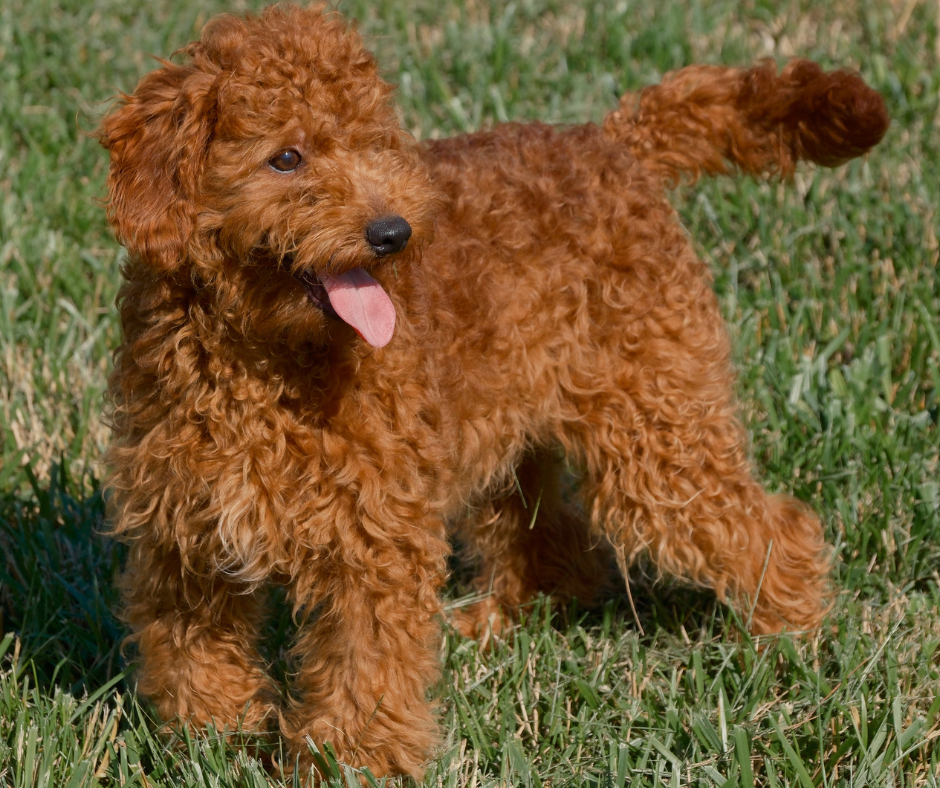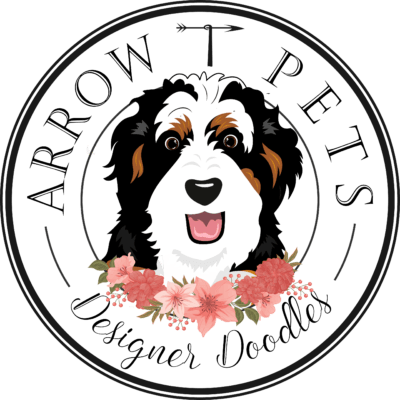
Creating a Comfortable Space for Your Goldendoodle in Your Apartment
Share
The Goldendoodle, a mix between Golden Retrievers and Poodles, are known for their friendly, intelligent, and adaptable nature. These traits make them suitable for apartment living, provided they have a comfortable and stimulating environment. Creating a cozy and functional space for your Goldendoodle in an apartment involves considering their physical and mental needs, ensuring safety, and fostering a positive atmosphere.
To create a comfortable space for your Goldendoodle in an apartment, focus on essentials: a cozy bed in a quiet spot, regular feeding and watering stations, and designated areas for play and exercise. Use puzzle toys for mental stimulation, keep the space safe by pet-proofing, and ensure regular grooming. Maintain a consistent routine and provide comfort items to reduce anxiety. This setup ensures your Goldendoodle feels secure, happy, and well-cared for.
Understanding Goldendoodle Needs
Before setting up a space for your Goldendoodle, it’s important to understand their specific needs. Goldendoodles are active, intelligent dogs that require physical exercise, mental stimulation, and social interaction. They thrive in environments where they can engage in various activities and feel secure. Knowing this, you can create a space that not only meets their basic needs but also enhances their overall well-being.
Sleeping and Resting Areas
Creating a comfortable sleeping and resting area is crucial for your Goldendoodle's comfort and health.
- Choosing the Right Bed: Invest in a high-quality dog bed that supports your Goldendoodle's joints and provides warmth. Orthopedic beds are particularly beneficial for larger Goldendoodles or those with joint issues. The bed should be large enough for your dog to stretch out fully and should be placed in a quiet, draft-free area.
- Designating a Sleeping Spot: Choose a designated sleeping spot that is away from the main traffic areas of your apartment but still allows your Goldendoodle to feel part of the household. This helps create a sense of security and belonging.
- Crate Training: If you use a crate, ensure it is comfortable and welcoming. The crate should be spacious enough for your dog to stand, turn around, and lie down comfortably. Use soft bedding and consider covering the crate with a blanket to create a den-like atmosphere.
- Temperature Control: Ensure the sleeping area is not too hot or cold. Goldendoodles, especially those with thick coats, can be sensitive to extreme temperatures. Use fans or heaters as necessary to maintain a comfortable environment.
Feeding and Watering Stations
Proper feeding and hydration are essential for your Goldendoodle’s health.
- Choosing the Right Bowls: Use stainless steel or ceramic bowls for food and water, as they are durable and easy to clean. Avoid plastic bowls, which can harbor bacteria and cause allergic reactions in some dogs.
- Placement: Place the feeding and watering stations in a quiet, accessible area away from the dog's sleeping area. This helps prevent spills and messes in the resting area and encourages calm eating and drinking.
- Elevated Bowls: Consider using elevated bowls, especially for larger Goldendoodles. Elevated feeding can aid in digestion and reduce the strain on the neck and joints.
- Regular Cleaning: Clean the food and water bowls regularly to prevent bacterial buildup. Refill water frequently to ensure your dog always has access to fresh water.
Exercise and Play Areas
Despite the space limitations of apartments, providing adequate exercise and play opportunities is crucial for a Goldendoodle's physical health and mental well-being.
- Indoor Play Space: Designate an area for indoor play, such as a living room corner or hallway. This space should be free of breakable items and provide enough room for games like fetch or tug-of-war.
- Puzzle Toys and Interactive Games: Use puzzle toys and interactive games to keep your Goldendoodle mentally stimulated. These toys challenge their problem-solving skills and provide a productive outlet for their energy.
- Daily Walks and Outdoor Time: Ensure your Goldendoodle gets regular outdoor exercise, whether through walks, runs, or trips to the dog park. Outdoor activities are essential for physical health and offer opportunities for socialization.
- Stair Climbing: If your apartment building has stairs, incorporate stair climbing into your dog's exercise routine. It’s a great way to burn off energy and strengthen muscles, especially for younger or more energetic Goldendoodles.
Safety Considerations
Safety is paramount in creating a comfortable living space for your Goldendoodle.
- Pet-Proofing: Pet-proof your apartment by securing loose wires, removing toxic plants, and storing harmful substances like cleaning supplies out of reach. Use baby gates to restrict access to certain areas if necessary.
- Secure Windows and Balconies: Ensure windows and balconies are secure and that there is no risk of your dog falling or escaping. Use screens or barriers to prevent accidents.
- Non-Slip Rugs and Mats: Place non-slip rugs or mats in areas where your dog spends time to prevent slipping and injury, especially on hardwood or tile floors.
- Identification and Microchipping: Ensure your Goldendoodle wears a collar with identification tags and consider microchipping them for added security. This is crucial in case your dog escapes or gets lost.
Grooming and Hygiene
Regular grooming and hygiene practices are essential for the health and comfort of your Goldendoodle.
- Grooming Station: Set up a designated grooming station in your apartment. This can be a specific area in your bathroom or a utility room. Keep grooming tools like brushes, combs, nail clippers, and grooming wipes organized and easily accessible.
- Regular Brushing: Goldendoodles, particularly those with curly or wavy coats, require regular brushing to prevent mats and tangles. Brush your dog several times a week and schedule professional grooming every 6-8 weeks.
- Bathing: Bathe your Goldendoodle as needed, typically every 4-6 weeks. Use a gentle, dog-specific shampoo and conditioner to maintain coat health and avoid skin irritation.
- Dental Hygiene: Maintain your dog’s dental health by brushing their teeth regularly and providing dental chews. Good dental care prevents plaque buildup and reduces the risk of gum disease.
Mental Stimulation and Enrichment for Your Goldendoodle
Providing mental stimulation is crucial for a Goldendoodle’s well-being, especially in an apartment setting.
- Interactive Toys: Use interactive toys that challenge your dog’s mind, such as treat-dispensing puzzles, snuffle mats, and interactive ball toys. Rotate these toys regularly to keep your dog engaged.
- Training and Trick Learning: Engage your Goldendoodle in regular training sessions, teaching new commands or tricks. This not only improves obedience but also provides mental exercise and strengthens the bond between you and your dog.
- Scent Games and Hide-and-Seek: Play scent games by hiding treats around your apartment and encouraging your dog to find them. Hide-and-seek, either with toys or people, is another fun game that provides both physical and mental stimulation.
- Music and TV for Dogs: Some Goldendoodles enjoy music or watching TV, which can be particularly helpful in reducing anxiety when left alone. There are even dog-specific music playlists and TV channels designed to be calming.
Creating a Safe Space for Alone Time for Your Goldendoodle
Goldendoodles are social animals and can experience separation anxiety. Creating a safe and comfortable space for them when you are not home is essential.
- Comfort Items: Leave familiar items, such as a favorite blanket or toy, in the area where your dog stays while you’re away. Your scent on these items can be comforting to your dog.
- Calming Aids: Consider using calming aids like pheromone diffusers, anxiety wraps, or calming music to create a soothing environment. Consult your vet before using any new products.
- Gradual Alone Time Training: Train your Goldendoodle to be comfortable alone by gradually increasing the time they spend without you. Start with short periods and slowly extend the time as your dog becomes more accustomed to being alone.
- Consistent Routine: Maintain a consistent routine for feeding, walks, and playtime. Predictability helps reduce anxiety and provides a sense of security.
Socialization and Interaction
Regular socialization and interaction are vital for a well-rounded Goldendoodle.
- Meet and Greet: Arrange regular meet and greets with other dogs and people to keep your Goldendoodle well-socialized. This is crucial for preventing behavioral issues and fostering good manners.
- Dog-Friendly Activities: Participate in dog-friendly activities such as group training classes, dog parks, or doggy daycare. These activities provide valuable social interaction and mental stimulation.
- Involve Family Members: Involve all household members in the care and training of your Goldendoodle. This helps your dog build strong relationships with everyone and understand its role within the family.
Travel and Mobility Considerations for Your Goldendoodle
If you live in a high-rise apartment or travel frequently, consider how this impacts your Goldendoodle.
- Elevator Training: Train your dog to be comfortable in elevators. Use treats and positive reinforcement to make elevator rides a positive experience.
- Stairs and Mobility: If your apartment has stairs, ensure they are safe for your Goldendoodle, especially if they are elderly or have mobility issues. Consider using ramps if necessary.
- Car Travel: If you travel often, ensure your dog is comfortable in the car. Use a pet seatbelt or a secure crate for safety during trips.
Health and Veterinary Care
Regular health check-ups and preventive care are essential for your Goldendoodle's well-being.
- Veterinary Visits: Schedule regular veterinary visits for health check-ups and vaccinations. Early detection of health issues is key to effective treatment.
- Health Monitoring: Monitor your Goldendoodle for signs of illness or discomfort, such as changes in appetite, behavior, or physical condition. Promptly consult your vet if you notice any concerns.
- Pet Insurance: Consider getting pet insurance to cover unexpected medical expenses. This can provide peace of mind and ensure your dog gets the care it needs.
Creating a comfortable space for your Goldendoodle in an apartment involves careful planning and consideration of their needs. From a cozy sleeping area to engaging play spaces and proper grooming, each aspect contributes to your dog's happiness and health. By providing a safe, stimulating, and loving environment, you ensure your Goldendoodle thrives in your apartment, making it a pleasant experience for both of you. Remember, a well-cared-for Goldendoodle is a happy and loyal companion, bringing joy and companionship into your home.
